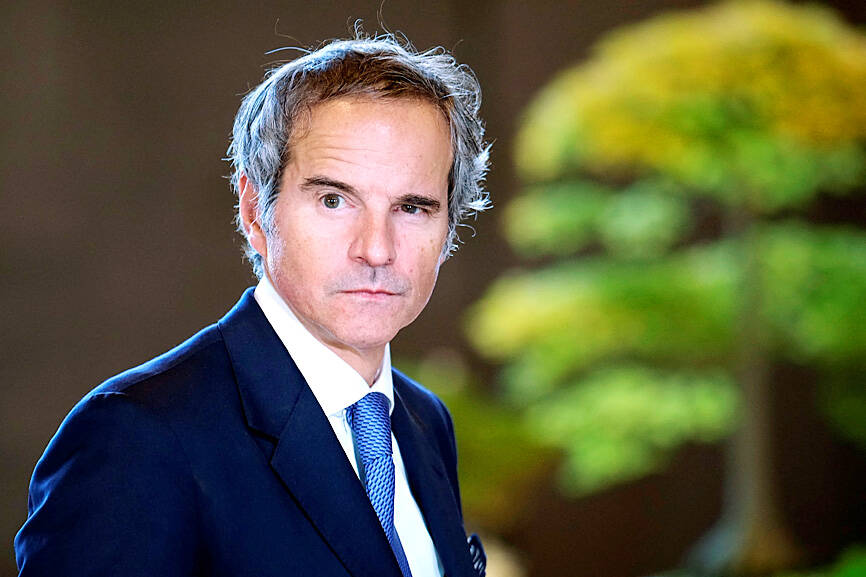Japan’s plan to release treated wastewater from the Fukushima Dai-ichi nuclear power plant disaster site is in line with global safety standards, the International Atomic Energy Agency (IAEA) said after completing a two-year review.
The agency found the proposals for “controlled, gradual discharges of the treated water” into the Pacific Ocean “would have a negligible radiological impact on people and the environment,” IAEA Director-General Rafael Grossi said in a foreword to a report handed yesterday to Japanese Prime Minister Fumio Kishida.
IAEA officials would continue to review the release of the wastewater and conduct live monitoring.

Photo: Reuters
The conclusion of the agency’s study enables Japan “to take the decisions that you may wish to take to continue and move on to the next phase,” Grossi said as he met with Kishida.
An assessment of the discharge facility by a domestic nuclear regulator is still required before a timeline is finalized to begin releasing the water — equivalent in volume to about 500 Olympic-size swimming pools.
Japanese government officials have said that the discharges, which could take decades, would begin during the summer.
“I will not allow a release that would harm people or the environment in Japan or around the world,” Kishida told reporters. “I will continue to explain carefully at home and abroad, on a scientific basis and with a high degree of transparency.”
The proposal has been harshly criticized by China’s government, sparked public protests in South Korea, and faces opposition from some local residents and members of Japan’s fishing industry. Cosmetics brands to seafood exporters are among those to have been targeted with potential boycotts.
China again urged Japan to stop the plan to discharge the contaminated water, the Chinese Ministry of Foreign Affairs said in a statement yesterday.
China also expressed regret at the IAEA report endorsing the plan.
Tokyo Electric Power Co (Tepco), which operates the nuclear power plant, cycles in water to keep fuel and debris cool at the disaster site.
That contaminated water is processed to remove most radioactive elements, except tritium, which is more difficult to eliminate at low concentrations.
The liquid is stored in about 1,000 tanks and Tepco plans to further dilute the waste with seawater before releasing it off the coast through a tunnel.
The Japanese government and Tepco have said that removing the wastewater and storage tanks is necessary to allow full decommissioning of the nuclear plant, which suffered a meltdown in 2011.
“This process of dilution, and chemical and other filtering, is nothing new, it’s something that exists in the industry,” Grossi said in a separate briefing in Tokyo.

AIR SUPPORT: The Ministry of National Defense thanked the US for the delivery, adding that it was an indicator of the White House’s commitment to the Taiwan Relations Act Deputy Minister of National Defense Po Horng-huei (柏鴻輝) and Representative to the US Alexander Yui on Friday attended a delivery ceremony for the first of Taiwan’s long-awaited 66 F-16C/D Block 70 jets at a Lockheed Martin Corp factory in Greenville, South Carolina. “We are so proud to be the global home of the F-16 and to support Taiwan’s air defense capabilities,” US Representative William Timmons wrote on X, alongside a photograph of Taiwanese and US officials at the event. The F-16C/D Block 70 jets Taiwan ordered have the same capabilities as aircraft that had been upgraded to F-16Vs. The batch of Lockheed Martin

GRIDLOCK: The National Fire Agency’s Special Search and Rescue team is on standby to travel to the countries to help out with the rescue effort A powerful earthquake rocked Myanmar and neighboring Thailand yesterday, killing at least three people in Bangkok and burying dozens when a high-rise building under construction collapsed. Footage shared on social media from Myanmar’s second-largest city showed widespread destruction, raising fears that many were trapped under the rubble or killed. The magnitude 7.7 earthquake, with an epicenter near Mandalay in Myanmar, struck at midday and was followed by a strong magnitude 6.4 aftershock. The extent of death, injury and destruction — especially in Myanmar, which is embroiled in a civil war and where information is tightly controlled at the best of times —

Taiwan was ranked the fourth-safest country in the world with a score of 82.9, trailing only Andorra, the United Arab Emirates and Qatar in Numbeo’s Safety Index by Country report. Taiwan’s score improved by 0.1 points compared with last year’s mid-year report, which had Taiwan fourth with a score of 82.8. However, both scores were lower than in last year’s first review, when Taiwan scored 83.3, and are a long way from when Taiwan was named the second-safest country in the world in 2021, scoring 84.8. Taiwan ranked higher than Singapore in ninth with a score of 77.4 and Japan in 10th with

SECURITY RISK: If there is a conflict between China and Taiwan, ‘there would likely be significant consequences to global economic and security interests,’ it said China remains the top military and cyber threat to the US and continues to make progress on capabilities to seize Taiwan, a report by US intelligence agencies said on Tuesday. The report provides an overview of the “collective insights” of top US intelligence agencies about the security threats to the US posed by foreign nations and criminal organizations. In its Annual Threat Assessment, the agencies divided threats facing the US into two broad categories, “nonstate transnational criminals and terrorists” and “major state actors,” with China, Russia, Iran and North Korea named. Of those countries, “China presents the most comprehensive and robust military threat